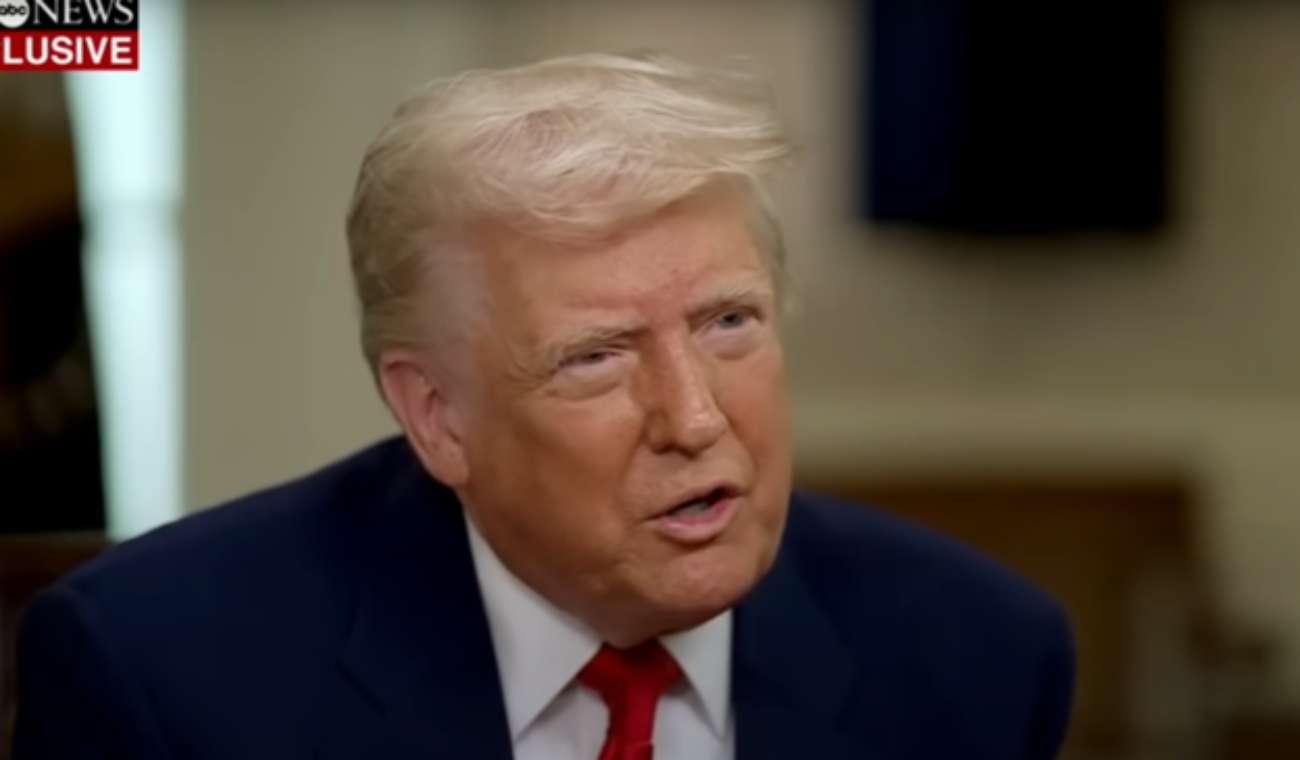Trump's Tattoo Fantasy Raises the Question: If He Were Senile, How Would We Know?

The Trump administration concedes that Kilmar Abrego Garcia, a Salvadoran who had lived in the United States since 2012, was illegally deported to his native country on March 15 due to an "administrative error." But it says there was good reason to expel him because he is a member of MS-13, an international criminal gang. That much is clear, President Donald Trump insisted in an interview with ABC News correspondent Terry Moran this week, because Abrego Garcia "had MS-13 tattooed" on "his knuckles." Abrego Garcia did not have MS-13 tattooed on his knuckles. Rather, he had four tattoos on the fingers of his left hand—a marijuana leaf, a smiley face with X eyes, a cross, and a skull—that the government has controversially interpreted as evidence of his alleged MS-13 affiliation. In a picture that Trump posted on X last month, the president is holding a photo of those tattoos, captioned "Kilmar Abrego Garcia MS-13 Tattoo" and superimposed with labels that include the characters M, S, 1, and 3 across the fingers. "They said he is not a member of MS-13," Trump wrote, "even though he's got MS-13 tattooed onto his knuckles." Although Trump clearly mistook those labels for ink that had been injected into Abrego Garcia's skin, he adamantly refused to acknowledge his embarrassing error when Moran pointed it out. That episode poses a puzzle that is apt to come up repeatedly during the next three and a half years: When Trump says something that is clearly not true, does it reflect his longstanding character traits, or does it reflect the sort of cognitive decline that forced Joe Biden to withdraw from last year's presidential race? At 78, Trump is four years younger than Biden. But by the end of his term, Trump will be older than Biden was when his disastrous debate performance made it plain that his mental faculties were slipping. And you can be sure that if Biden had displayed the sort of stubborn obliviousness that was evident in Trump's conversation with Moran, Republicans would have cited it as clear evidence of his encroaching senility. If you think I am exaggerating, watch the interview or read the transcript. The relevant exchange begins when Moran asks Trump about Abrego Garcia, whom he describes as "the Salvadoran man who crossed into this country illegally but who is under a protective order that he not be sent back to El Salvador." Moran notes that "your government sent him back to El Salvador and acknowledged in court that was a mistake." He adds that the Supreme Court has upheld an order requiring the government to "facilitate his return to the United States." Moran asks what the Trump administration is doing to comply with that order. Abrego Garcia "is not an innocent, wonderful gentleman from Maryland," Trump says. He is an "MS-13 gang member" with a history of domestic violence who "came into our country illegally." How does Trump know that Abrego Garcia is a member of MS-13? Although "he said he wasn't a member of a gang," Trump explains, "they looked" and saw that "on his knuckles he had MS-13….He had MS-13 on his knuckles tattooed." Moran corrects Trump, saying "he has some tattoos that are interpreted that way." No, Trump insists: "It says 'M-S-1-3.'" That label, Moran notes, was added by "Photoshop." Trump is incredulous: "That was Photoshop?" He thinks Moran is obviously wrong, because Abrego Garcia "had MS-13 tattooed" on his hand. Moran wants to "move on," saying, "We'll agree to disagree." But Trump will not let go of the subject. "Do you want me to show the picture?" he says "Go look at his hand. He had MS-13." Moran allows that "he did have tattoos that can be interpreted that way." Trump can't believe how misleading Moran is being: "Terry, no, no. No, no. He had MS as clear as you can be. Not 'interpreted.' This is why people no longer believe the news, because it's fake news." When Abrego Garcia "was photographed in El Salvador," Moran notes, he had no tattoos like the ones Trump is describing. "Oh, oh," Trump says. "They weren't there, but they're there now, right?" Wrong, Moran says: "They're in your picture." Moran really wants to talk about Ukraine, but Trump still thinks it is important to set the record straight: "He's got MS-13 on his knuckles." He adds that "you do such a disservice" by denying that supposedly documented fact. "Why don't you just say, 'Yes, he does,' and, you know, go on to something else?" Because that point is "contested," Moran charitably says before finally getting Trump to talk about Ukraine instead. Trump's manner, tone of voice, and persistence during this exchange suggest he sincerely believes what he is saying. He is not even willing to entertain the possibility that he might be wrong. In Trump's mind, it is Moran who is either mistaken or deceptive. You could say that is what you would expect from a man who continues to insist, notwithstanding all the evidence to the contrary, that he actually won reelection in 2020. Trump, after all, has never felt obliged to acknowledge reality when it conflicts with his agenda or self-image. But advancing age can only expand Trump's capacity for self-delusion, and in this tattoo discussion he comes across as a confused old man. Consider another example: the special tariffs on Mexican, Canadian, and Chinese goods that Trump said were aimed at pressuring the leaders of those countries to help stop the flow of illicit fentanyl into the United States. Although that rationale never made much sense, it was at least comprehensible. The same cannot be said of the explanation that Trump offered on Truth Social last month: The aim of taxing imports from Canada, he said, was to "penalize Canada for the sale, into our Country, of large amounts of Fentanyl, by Tariffing the value of this horrible and deadly drug in order to make it more costly to distribute and buy." As Reason's Brian Doherty notes, that description suggests "Trump's understanding of what he's even doing is deficient," since he seems to think "his tariffs will be taxing and thus raising the price of the illegal fentanyl he fantasizes is flooding the United States from the north." That misconception goes beyond Trump's intermittent insistence that the cost of tariffs is borne by foreign countries rather than U.S. businesses and consumers. If Trump thinks he is "tariffing the value of this horrible and deadly drug in order to make it more costly to distribute and buy," he imagines that drug traffickers, whose entire business model is based on defying the law, nevertheless are keen to comply with his new taxes by declaring their imports at the border and forking over 25 percent of their value. Like the highly incriminating but imaginary tattoos that Trump thinks Abrego Garcia has, his assertion that drug smugglers are paying tariffs seems like a fantasy rather than a lie. But given the power that Trump is either exercising (in the case of tariffs) or declining to exercise (in Abrego Garcia's case), these are potentially consequential fantasies. Maybe Trump is just being Trump, or maybe his already tenuous connection to reality is slipping with age. With Trump, it is hard to draw such distinctions. Similarly, Trump's frequently puzzling rhetorical detours are not necessarily a sign of cognitive decline, since his style of speech has long been meandering and full of non sequiturs. I am not saying the president is senile. But if he were, how would we know?


















